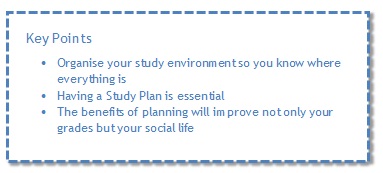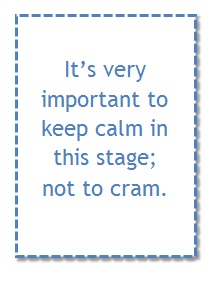Prepare for your Exams with this complete guide to Exam Success. The guide explores important areas such as organising you timetable, getting the right mind set and setting realistic and achievable goals. The tips and ideas in this guide will help you achieve exam success.
Pinned to
50263
15
7
No tags specified
|
|
Created by PatrickNoonan
over 12 years ago
|
|
Rate this resource by clicking on the stars below:




 (2)
(2)
Ratings (2)
| 2 | ||
| 0 | ||
| 0 | ||
| 0 | ||
| 0 |
7 comments
almost 11 years ago
Great help. Thank you very much.
over 11 years ago
BUT MOTIVATION THOUGH
over 11 years ago
Thats helpful, cheers bro
over 11 years ago
yea its kinda helpful but how to STAY motivated?
over 11 years ago
But dude, where will i get the motivation from?
over 11 years ago
(edited)
@rachelH
Thanks Rachel! Which parts did you find most helpful? You have any tips of your own you think should be added??
over 11 years ago
That is really helpful
Close
33425
note
2017-01-24T15:12:22Z
1/1
The road to achieving successful exam results may seem like a long and arduous one for most of us. However, you shouldn't be discouraged from the journey, so long as you take it one step at a time.












If you enjoyed this guide you might also like:
View a Flashcard deck of study tips , click here
Click here for full-screen, interactive Mind Map on Exam Preparation


Follow this guide on how to prepare and keep focused on the journey ahead. If you do, you will reap the rewards of successful exam results and break down the journey into manageable paths.
A word of advice from the outset though; achieving good exam results should never be your only motivation, you must discover your own motivations. While getting straight A’s feels great and is a tremendous achievement you should have your own goals you wish to achieve by successfully completing your exams. This underlying motivation is personal to each of us but once you discovered this knowledge it will guide you through the rough and dark parts of your journey.
While it may seem slightly hyperbolic to compare exams with a perilous and adventurous journey there are a lot of similarities, especially if you ever want to make it to the end! Preparation is key, having the motivation and energy to get up and go—even when it seems impossible—are essential and most importantly of all, you always need to have one eye on the prize; the end goal, the destination, the exam!
Adopting such a mindset will not only make the humdrum business of studying more exciting but will allow you to celebrate the small victories along the way.
Many people will tell you they find it hard to sit down and study; this may feel true but it’s not! Everyone has the capability to study and absorb information; what we all can suffer from, however, is a lack of motivation. This guide will give you tips on how to implement study practices that help keep you motivated and help you succeed!
Before you start any journey you need a destination and a map! Exams are no different. Most of you will know roughly, if not exactly, when your exams will be on. Whether you’re preparing for a mid-term test or an end of year exam, you should always know what it is you are preparing for. However, it is not simply when they are that is important. Before you even begin contemplating studying you should consider what you want to achieve.
Do you want straight A’s? Who doesn't right? But you may be setting yourself up for failure! Set yourself realistic goals; if you got a C last year in English, aim for a B this year. Realistically assess your strengths and weaknesses, you may have a natural aptitude and interest in one or more subjects but dread others. It may be easier to start studying your favourite subjects more often but you should ask yourself if such a strategy is productive. If you need to improve your grades in your least favourite subjects you should spend more time with these.
Before you start studying write out a simple plan of the grades you want to achieve by the end of the year[1].
A classic tool to help you define your goals is to use a S.M.A.R.T. plan. This refers to:
Specific:
This means your goals are clearly defined, they aren't ambiguous. A good example would be: By the end of the year I want to achieve an A. A bad example would be: I want to be satisfied with my results.Measurable:
Having clearly defined goals means that you know when you have accomplished them. In the above examples, you will know if you got an A or not, however whether you are satisfied with the results might be open to debate. The importance of having your goals measurable is so that you know when things are going right and can celebrate your victories but also, crucially, you know when you have under-achieved and can become aware that you need to change your strategy and/or work harder.Attainable:
A goal can be well defined and measurable but there is little point in doing so if you know you can never achieve it. If you failed a class last year, don’t aim for an A this year. Your ambition should be lauded but in the long run, if you see you aren’t making as much progress as you’d like, you will be become disheartened and this will negatively affect your motivation and study skills.Relevant:
The goals you set yourself must hold meaning. There is little point in taking the time to set yourself a goal if its accomplishment means nothingTimely:
For most of you, having the end goal of your exams coming up will mean your goals will have a context of time. This is an important element of any goal as it provides an impetus for action and means you know how much work is needed each day in order to achieve your goals.When planning the most important thing to do is be honest and realistic with yourself.
Adopting such a plan throughout your study, on a subject by subject basis, will aid you greatly but having a thorough understanding of your ‘big’ or ‘broader’ goals—the goals that traverse your subjects-- from the outset will help you contextualize every action taken thereafter. It will give you a barometer to measure your actions against and you will know if what you’re doing is in line with your goals or not. Following this approach will give you the roadmap that will guide you on your journey and will be an important tool in keeping you motivated.
__________________________________________________________________
[1] Or whenever you have set your ‘destination’ for. Also, take account of any minimum course requirements you may need to achieve.
[1] Or whenever you have set your ‘destination’ for. Also, take account of any minimum course requirements you may need to achieve.
Now that you have your overall plan mapped out, you need to get supplies and prepare yourself for the journey ahead! Three basic tips to get you started:
- Never underestimate the benefits of a well-stocked stationary drawer, having all the necessary tools to hand will save you a lot of time and make your study more efficient.
- It’s also important to have a proper filing system in place! Knowing where everything is can save you countless hours over the year.
- Most importantly, having all the content you need at your fingertips reduces frustration, makes you more productive and, of course, keeps you motivated!
Another crucial aspect of your study journey is planning. Creating a study plan and sticking to it is the No. 1 tip for successful exam results. Unlike your S.M.A.R.T. plans your study planner or timetable should be more specific and detail what you will do on a daily basis, topic by topic, subject by subject. When you’re creating your timetable though, make sure you include free time for relaxation and your social life. You should also keep it somewhat flexible to ensure that if, for example, you miss a day because you’re sick you can make it up at a later date.
The benefits of creating a study planner are numerous:
Your study immediately becomes more productive as you know exactly what you should be doing, when you should be doing it and how long it will take you. You will get a better return on investment than if you simply opened a book and started to study a topic. You become more productive and your study is of a higher quality- it’s a win-win.
There are also numerous psychological benefits of implementing your timetable before you start your arduous journey:
- You don’t panic, waking up in the middle of the night with the dreaded exam fear, because you feel on top of things.
- You know what you’ve done and what you need to do and, importantly, you know when you need to have it done by. So long as you stick to your timetable you can sleep easy
- This ease of mind means you become more confident in how you approach your study.
- You won’t feel guilty about spending time with friends or watching TV as you know that you covered you’re allotted study requirements.
A side note, some people find a study planner too restrictive and as such abandon the whole concept all together. You shouldn’t do this; if you don’t like timetables give yourself a number of hours for each day. If you study more one day you can take it away from another day and vice versa if you want to finish early one day you can make it up the next. Such an approach could be very beneficial for some types of studiers. What’s important though is that you have some kind of plan in place.
Another useful tip is to use exams as stepping stones. This is especially prevalent for mid-term exams. You should use these exams as a barometer of the progress you are making. You shouldn’t be discouraged if that C isn’t yet a B but you should at least be maintaining and hopefully progressing. If this isn’t the case you need to re-evaluate your study patterns.
Getting organised is the final step before you actually put your foot out the door and take to the road. If you have followed the first two steps you will be well on your way to exam success and reaching your destination.
Step Two: Organise
Step One: Define
Step Three: Create
When it comes down to actually studying you shouldn’t just sit there reading your text book from beginning to end. You should always be in the process of creating a study resource; something you can return to again and revise later. This could be a summary sheet, a note, a flashcard deck, a mindmap, acronyms or any number of other tools that help you study.
When you’re in class, taking notes can be very beneficial. However, depending on what type of learner you are, you may approach things differently. Some people like to take down what the teacher/lecturer says word for word, some put it in their own language and some simply prefer to listen[1]. You should know which style suits you best as this will help your study patterns.
When reading from a text you shouldn’t read passively. You should be actively engaged; highlighting keywords and phrases, making notes in the margins and taking down notes in your own words. Doing these simple tasks will greatly improve your retention of the topic covered. It is better to cover 5 pages actively then to passively read a whole chapter. You’ll get more out of it in the long run.
Also, a tip on highlighting: you shouldn’t highlight more than one sentence per paragraph as if you highlight too much, it becomes meaningless—only highlight the most important parts.
If you can put notes into your own words this shows that you have fully understood the concepts. This will help you when it comes to revising it as it is easier to recall something written in your own language.
- Flashcards are perfect for memorizing vocab lists, definitions or formulas and can be used for a myriad of other topics.
- Mindmaps can be used for representing your notes visually but also for brainstorming and planning sample essay-style answers. Simply have each node represent one paragraph and include all the pertinent information in nodes off that.
- Mnemonic devices are an easy way of learning of lists. A famous example is ‘Richard Of York Gave Battle In Vain’ which gives the first letter of each colour of rainbow: Red, Orange, Yellow, Green, Blue, Indigo, Violet.
Although it may seem easier and more productive to use materials from teachers/lecturers and other professionals, creating your own study resources so that they are written in your words, and have your emphasis on what is important, will be an immense help when it comes to studying and revising them later on and closer to the exam date.
Keeping on top of your creation of study aids as you engage with new content on a daily basis in class will mean less study in the long run and more productive study over time. This can only lead to better results and greater motivation.
Creating different study aids as you go along is the equivalent of putting one foot in front of the other as you travel along the road. It’s not glamorous but it is what gets you from A to B… or hopefully in this instance B to A![2]
____________________________________________________________
[1] These learners may wish to invest in a Dictaphone to help them recall classes/lecturers.
[2] Too corny?Step Four: Study
In truth you have already started studying when you sat down to create your study resources. However, what I mean by study in this context is different from the creation aspects. Creation is something that should be happening all year round; after every class, every week you should be compiling study resources. When it comes to study though you are more focused on preparing for your exams as opposed to documenting what you covered in class.
You should be going back over the study resources you created from week 1. Study consists of taking the content you have learned in class and applying it to an exam context. So, you frame the content in the style of your exams. If all your exams are multiple choice, then practice using that format! If your exams are essay style then practice these. There are numerous ways to prepare for each style of exam. You should practice as much as possible.
- For short questions or multiple choice style exams your focus should be on memorization.
- For essay style answers you should focus on making connections; focus on the topics that are likely to come up and have a store of facts and quotes and ideas that you can apply to differing contexts.
You don’t need to know everything and you shouldn't panic if you can’t master a topic in its entirety. You may be able to cover 80% of the course work but find mastering that last 20% takes as much time as the 80% that went before; this is quite common! If you have numerous subjects or are covering numerous topics it may be best to quit while you’re ahead and move on instead of expending so much energy on trying to master that final bit of content. You have to think of the big picture.
A good tip for exam strategy is that it may be possible to disregard certain topics so long as you cover other ones. This may sound dangerous but it is actually studying smarter. It’s very important though, that you always give yourself options. If you know you have to answer on three topics then study at least five. The question on the day could be awkwardly phrased and might throw you so you should have options.
You should prioritise your subject topics in order of how capable you are at each and plan from there. Everyone will have a weakness in a subject so you should try and strategise so that you can give your best answers. This may not always be possible but where it is, focus on your strengths and bolster your weaknesses enough so that they don’t impact on your overall score.
Practice papers are key to good study. If you’re lucky enough to have example past papers for your exams then these should be your first port of call. If you don’t have any past papers to go on, then don’t hesitate to ask your teacher for example questions or for the structure of the exam. Having these facts is paramount when preparing for exams.
When you start studying you can see your destination on the horizon. It’s still a long way away but it’s closer than ever before! You shouldn’t look at the approaching Exam with trepidation you should greet it happily as the traveler would be invigorated by the sight of their destination.
Step Five: Success
So, you've planned, created and studied to get to this point, the exams are upon you! When exam time is looming the stress may build. It’s very important to keep calm in this stage; not to cram. If you have followed the other steps then you should be well prepared to maintain a steady pace. You may wish to ramp up your timetable hours closer to your exams but you should always have time to relax, do what you want to do and don’t be afraid to socialise too!
The importance of sleep is also something I wish to emphasize when exams are approaching. Getting enough sleep is always an issue but the closers the exams the greater the temptation there is to stay up late and study. You should fight this urge as much as possible! 7 to 9 hours a night is the average and teenagers need the most sleep out of all age groups; so make sure you’re getting enough. Been well rested will give you a solid bedrock that will sustain you throughout the day and make your revision more fruitful. It will also keep your stress levels down which in turn will maintain your motivation.
Likewise with diet, it’s an old one but Breakfast really is the most important meal of the day. Without it your concentration levels will plummet and your revision will suffer.
By the time your exams have come you should be able to use a number of‘trigger’ words. These are words that encapsulate a whole topic or area, when you come across them they should trigger a whole host of different ideas to unfurl in your head without the use of any study resources. When this occurs naturally you know you have covered a topic enough and that you’re prepared for your exams
At this point you are at the foot of the hill, the final hurdle you need to surmount before you have reached your destination. You shouldn’t rush to the finish line only to tire yourself out before you get there, maintain the same steady pace, keep your motivation high and be confident in the fact that you can reach your goal.
Homeward Bound
On the day of the exam very little should have changed in your routine, you should be :
- Be well rested,
- Be well fed,
- Be well prepared!
- Have all the necessary stationary.
- Plan to be at least a half hour early as this will reduce any stress you may have and will prevent you from being late which could upset all the hard work you put in.
If you do find you are stressed or are panicking take a few deep breaths to calm yourself down. You should rest easy in the knowledge that you have prepared yourself, step by step, for this, the final stop, on your journey to exam success.

You can download this guide for free by clicking on the link below:
The Journey Ahead
Step One: Define
Step Two: Organise
Step Three: Create
Step Four: Study
Step Five: Success
Homeward Bound
More ExamTime Resources
Download this Guide for Free!

